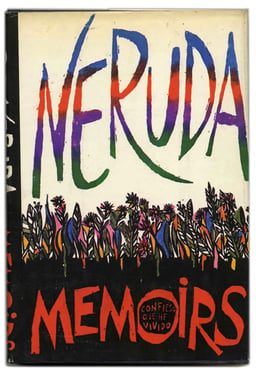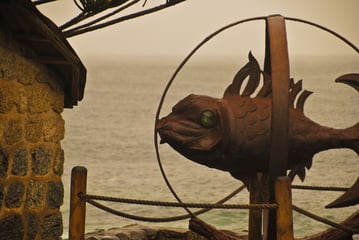The Chilean poet and diplomat Pablo Neruda hasn’t been alive—at least in physical form—since September 1973. Yet his work continues to live on, and often in unexpected ways. In June 2014, archivists at the Fundación Pablo Neruda in Santiago, Chile discovered a series of boxes that contained poems written by Neruda and published only in Spanish by Seix Barral. However, in many ways these poems became “lost” to a global audience as they were never translated into English. Thus, the project became known as “The Lost Poems of Pablo Neruda.” This month, the book is set to become available to English-language readers everywhere.
Copper Canyon and Crowdfunding
 According to an article in The New York Times about this serendipitous find, the earliest of the poems in the collection dates back to 1956. By 2015, Copper Canyon, a non-profit press in Washington state, had signed on to publish Forrest Gander’s translations of Pablo Neruda’s “lost” poetry.
According to an article in The New York Times about this serendipitous find, the earliest of the poems in the collection dates back to 1956. By 2015, Copper Canyon, a non-profit press in Washington state, had signed on to publish Forrest Gander’s translations of Pablo Neruda’s “lost” poetry.
How does a non-profit press find the money to fund the translation and publication of a previously unpublished English-language collection of Neruda’s poems? Copper Canyon opened a Kickstarter fund. While the non-profit press raised initial funds from its board and some of its donors to cover the cost of translation rights, it needed another $100,000 or so to pay for the costs of production and printing. For Copper Canyon, Kickstarter seemed like a great crowdfunding tool.
According to George Knotek, one of Copper Canyon’s publishers, donors should be pleased with the outcome of the project. As Knotek explained prior to the publication of the collection, “We will be taking special care to translate, design, and produce a book which honors the legacy of Pablo Neruda, and hopefully delights his followers.” Knotek went on to detail the source of the book’s funding, highlighting how Copper Canyon planned to “be reaching out to thousands of readers through a crowdfunding appeal.”
As you might have guessed, the crowdfunding appeal was successful. For many months now, Copper Canyon has been promising an April 2016 release of the book, entitled Then Come Back: The Lost Neruda.
Getting Your Hands on a Copy of the Book
 What’s so cool about this book? Aside from the fact that English-language readers haven’t yet had access to these poems, Copper Canyon’s publication will feature facsimiles of the notebooks and paper scraps upon which Neruda initially drafted these works. Indeed, the non-profit press planned, from the start, to reproduce Neruda’s handwriting in his signature green ink, giving readers access to the poet’s distinctive handwriting. The book will also include full-color archival photographs.
What’s so cool about this book? Aside from the fact that English-language readers haven’t yet had access to these poems, Copper Canyon’s publication will feature facsimiles of the notebooks and paper scraps upon which Neruda initially drafted these works. Indeed, the non-profit press planned, from the start, to reproduce Neruda’s handwriting in his signature green ink, giving readers access to the poet’s distinctive handwriting. The book will also include full-color archival photographs.
The translator, Forrest Gander, has previously translated collections by other Spanish-language poets, including Pura López-Colomé, Coral Bracho, and Jaime Sáenz. He has also worked on other Neruda translations, which have been included in The Essential Neruda: Selected Poems (2004).
On the whole, we’re very excited to see what this book holds and to discover, in English, this group of poems that has been deemed “lost.” At the same time, we have to ask ourselves: can any literary work be considered "lost" simply because it has not been known previously to an English-language audience? Or does such an assumption simply privilege the English language in ways that aren't helpful to thinking about Neruda's ultimate import? Likely, we’ll be contemplating those questions as we hold one of the Copper Canyon first editions in our hands.









